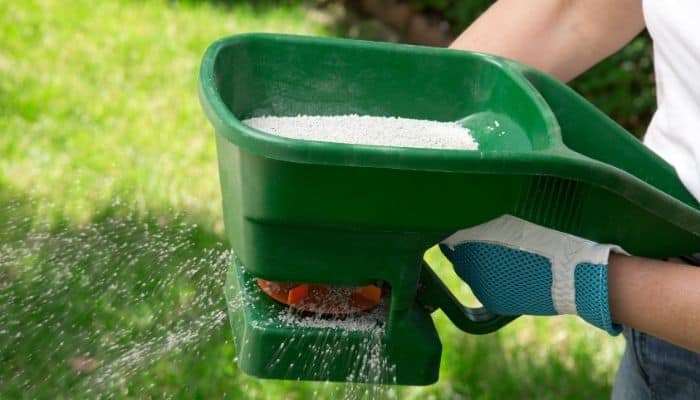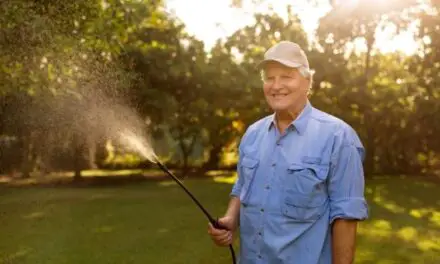Being able to fertilize your grass while eradicating weeds from your lawn at the same time definitely sounds like a win-win.
But is there a fertilizer that will do it effectively and what are the risks involved?
Table of Contents
Will Grass Fertilizer Kill Weeds?

Grass fertilizer will kill weeds if you use a special type of it called “weed and feed”. Weed and feed is a selective herbicide that will fertilize your grass while targeting and killing broadleaf weeds, such as dandelions.
While this all sounds great because of how much time it can potentially save, there are some serious drawbacks to using selective herbicides.
Let’s dig a bit deeper and look at some positives first.
Advantages Of Using Grass Fertilizer To Kill Weeds?
Using a grass fertilizer to kill weeds will certainly save a little time by killing two birds with one stone.
You won’t need to carry out two different jobs on your grass for the sake of fertilizing and weeding.
Not only does weed and feed save you time when tending to your lawn, but it can also save you money.
Depending on the brand that you choose, you only have to buy one product rather than two.
The best advantage of using grass fertilizer to kill weeds is that it stops many weeds from growing before they can take hold and become a problem.
It only kills growing weeds.
This means that if you already have an abundance of weeds in your garden then grass fertilizer may not be your best solution.
However, if you have just put down fresh grass, or spring is around the corner, then using grass fertilizer as a weed killer will save you the hassle of having to deal with them at all.
Also Read: Will Grass Fertilizer Kill Flowers? (What To Watch For)
Disadvantages Of Using A Grass Fertilizer To Kill Weeds?
The main disadvantage of using a grass fertilizer to kill weeds is that it contains harmful and toxic chemicals which can be carried into your home on shoes or anything that touches your lawn and then goes into your house.
Many selective herbicides contain pesticides, like 2,4-D which has shown to be harmful to people and the environment.
And once these pesticides end up in your home they last way longer than they would outside on your grass, because there isn’t any strong sunlight or organisms in the soil to break them down.
Research has even found that the insides of some homes had 10 times the levels of 2,4-D after certain selective herbicides were applied to their gardens.
They’re not good for the environment either.
The problem with these toxins is that they often sit on the topsoil and so are easily moved around by people when outside.
Even if you don’t sit down or lie in the grass, simply walking through the grass is enough for the toxins to get on your shoes.
These toxins are then carried into your home on your clothes and shoes and, unfortunately, are breathed in by you and your family.
And there’s really no need to spread weed killer all over your yard.
Weeds usually only occur on between 5-10% of grass!
So, you don’t need to cover your entire lawn with weed and feed as most areas of your grass won’t need a weedkiller.
You’re just needlessly covering your garden with chemicals that are harmful to you, your loved ones, and local wildlife.
Not only this, but your grass can actually react badly to the chemicals (especially over the long term).
The herbicides that can be found in some products for fertilizing grass can be harmful to the grass itself.
Using such strong chemicals can lead to long-term poor grass health.
There’s no point having no weeds if you have no grass!
One additional thing to note is that grass weeds will actually respond to the fertilizer, reacting differently to other types of weeds.
Most herbicides target broadleaf weeds but can end up fertilizing grass weeds that aren’t broad-leafed.
So, if you don’t target your weeds specifically, they may just thrive along with your grass!
How To Target Weeds Without Using Herbicides?
Although grass fertilizer can also kill weeds and seem like it’s saving you time and money, it comes with a fair few disadvantages and is most likely bad for your grass over time:
- Digging out the weeds.
- Organic herbicides.
- Maintaining a healthy lawn.
However, if you are short on time and/or money then solutions may not be the best for you.
The best method of killing weeds is simply to remove them individually by hand when they appear.
This ensures that you are not using any harmful chemicals and that you are not ruining your perfectly healthy grass (which the vast majority of will never produce weeds!).
You can maintain a healthy lawn simply by watering it as needed and mowing according to the length of the grass.
Grass is a fairly uncomplicated plant to care for – it doesn’t require too much TLC, just sunlight and a little extra water when it’s young.
Organic herbicides are another method of killing weeds without harming your grass.
Their natural elements mean that you are not dealing with any nasty toxins.
Therefore, an organic weed and feed will give you the same outcome as a regular weed and feed but without many of the dangers.
How Long Does It Take For Grass Fertilizer To Kill Weeds?
It usually takes 5 to 7 days before you start noticing results with weed and feed and up to 3 weeks for weeds to disappear from your grass completely.
Always apply weed and feed at proper times, as post-emergent herbicides will have no effect unless weeds are actively growing.
When Should I Mow My Lawn After Applying Fertilizer
While each fertilizer product has its own instructions regarding when to mow after application, you can generally mow your lawn at least 24 hours after fertilizing.
Don’t remove grass clippings and let them sit on the lawn for the next 3 or 4 mowings.
Grass clippings contain up to 85% water and they decompose quickly returning essential nutrients, such as nitrogen back into the soil to further boost the health of your grass.
Can Grass Fertilizer Also Make Weeds Grow?
Yes, if you fertilize a lawn that has weeds on it with regular fertilizer, it will also increase the rate at which the weeds grow.
In fact, regular fertilizer will likely make the weeds grow faster than your grass because weeds usually consume resources more rapidly than other plants.
Final Thoughts
Many weed and feed fertilizers contain pesticides, such as 2,4-D and dicamba which have been shown to be harmful to people.
And once pesticides are tracked inside the home on shoes and boots, they last a lot longer than they would out on your lawn, because there isn’t any direct sunlight or soil organisms to break them down.
One study even found that levels of 2,4-D inside homes were around 10 times higher after certain herbicides were applied to lawns.
It’s worth spending a little more time and ridding garden weeds in as natural a way as possible.




